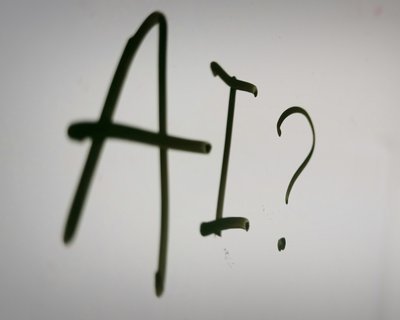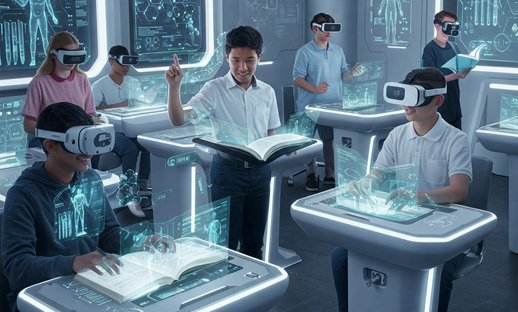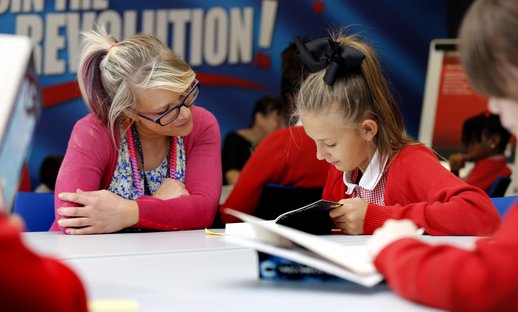AI and Literacy

Interest in, and use of, artificial intelligence (AI) continues to grow in popularity and sophistication, and barely a day goes by without someone writing about the topic.
The rapid development of generative AI continues to gain momentum with new and evolving tools increasingly becoming a ubiquitous part of daily life. The continued evolution of the digital sphere and rise of new (readily available) AI technologies has made us want to stop and consider the subsequent questions that naturally arise around the relationship between AI and literacy, with particular focus on its impact within education.
What is the impact of AI on children and young people's literacy skills?
This evolving literacy and education landscape is nothing new. From the invention of writing to the innovations around generative AI, what it means to be literate has always been changed by the technology we use to communicate.
Today, being literate increasingly includes the skills of effectively, critically and creatively engaging with generative AI, yet our education system is struggling to keep pace with its rapid growth and capabilities.
There are understandable questions and considerations about the impact on the way future generations and teachers will harness the digital tools to support education, and, therefore what this means for the future of literacy.
This is why, over the past few years through our Annual Literacy Survey, we have taken time to research generative AI in relation to its impact on literacy and understand how and why it is being used currently.
The relationship between AI and writing
Strong reading and writing skills enable and support young people and adults alike to communicate effectively with generative AI. These essential, ‘traditional’ literacy skills help users to craft a good question or prompt which is inputted into the AI tool – working in tandem with technology to maximise its output. Moreover, our recent research shows that reading and writing engagement is associated with more critical engagement with AI-generated content.
As the evidence base improves, it is important to consider whether – and how – generative AI might be meaningfully integrated into writing instruction in schools, especially for disengaged or struggling young writers.
The challenge will be to harness AI’s potential to support writing while preserving the core values of originality, creativity and persistence that make writing - and writing for pleasure - a transformative tool for learning and personal growth.
How can we support children and young people to understand the value of not just technically polished work, but appreciate the value of writing as a means to develop their critical thinking, creativity and unique personal voice? Similar consideration must be given to using AI to support reading.
Why is AI literacy important?
Our research demonstrates that continued investment and support in nurturing 'traditional' literacy skills amongst young people is a powerful way to unlock the value of AI and harness its potential. However, there are also considerations about what it means to have AI literacy skills, a term which has been defined as “understanding, using, evaluating and [considering] ethical issues” in relation to AI.
For young people and adults alike, learning to work effectively with AI tools and responses, such as adding your own take on the content generated, checking sources, deciding what to keep, is part of developing these good AI literacy skills.
Developments in AI have spotlighted issues around academic integrity, critical thinking and intrinsic motivation to learn. Our findings show that while many young people who use generative AI say they add their own thoughts and check outputs, 1 in 4 do not interact with these tools in a critical and creative way.
It is essential that all young people build the critical digital-literacy skills they need to learn, not just in terms of how to use the tools themselves but also about their wider digital ecosystem. This includes, for example, the ethical and environmental implications of generative AI, potential biases inherent in training data, and inaccurate content.
Our research method
The potential impact of generative AI, including tools such as ChatGPT, Claude, Gemini, Midjourney and Sora, is of particular interest to those working in the creative industries and education.
Since early 2023, we have been interested in exploring how these platforms and AI tools might influence, and potentially redefine, what it means to be literate in the digital age; addressing the future of literacy as it unfolds rapidly around us.
As a first step, we included questions about generative AI in our Annual Literacy Surveys of children, young people and teachers in early 2023 and 2024. This allowed us to explore attitudes, behaviour and confidence around using generative AI to support literacy and learning using data from tens of thousands of children and young people and more than a thousand teachers from primary and secondary schools across the UK.
AI and Literacy education: Research and commentary
-
These reports share findings on young people and teachers' use of generative AI to support literacy in 2025.Learn more about Young people and teachers’ use of generative AI to support literacy in 2025.
-
These reports share findings on children, young people and teachers' use of, and attitudes to, generative AI and literacy in 2024Learn more about Children, young people and teachers’ use of generative AI to support literacy in 2024.
-
This blog explores first findings from our research project exploring children, young people and teachers' use of, and attitudes to, generative AI and literacy in 2025.Learn more about Using generative AI to support literacy in 2025: What do we know?.
How can AI be useful in education to support literacy?
Read more about AI and education
Additional resources, training and research
-
What opportunities and challenges does digital technology present to children's literacy?View details about Digital literacy and technology
-
Blog
But what does this look like in reality and how do we begin to define what it means?Read post about The Future of Literacy: What does it mean to be 'literate' in today's world? -
Evidence-based CPD and inspiring conferences to help you evaluate, plan and take action to improve literacy outcomes in your setting.View details about CPD training and workshops
-
As experts in children's literacy, we responded to the government's call for evidence to review the curriculum in England and compiled a series of recommendations.View details about Curriculum and Assessment Review in England
-
Research
This report presents findings from a survey exploring young people’s literacy and critical literacy attitudes and behaviours when navigating online environments.View details about Insights into young people’s literacy, critical digital literacy, online communication and wellbeing







